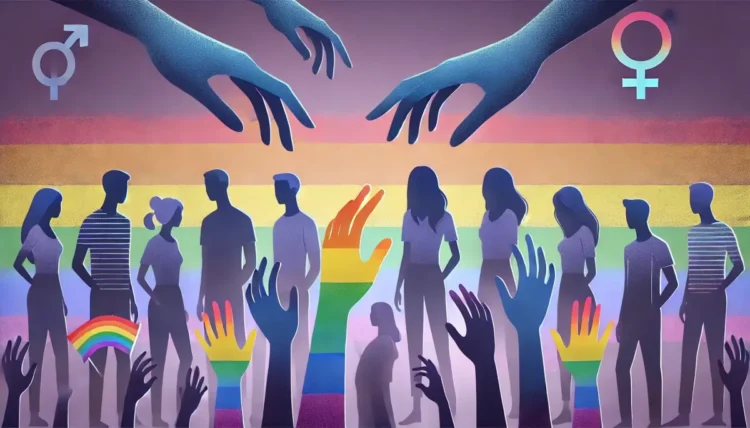Breaking Barriers, Building Support
Family violence is a critical issue affecting countless individuals, yet its impact within LGBTQI+ communities often remains unseen and underreported. The intersection of stigma, discrimination, and a lack of tailored resources compounds the struggles faced by LGBTQI+ survivors, leaving many without the support they desperately need. At Meducate, we are dedicated to raising awareness and equipping healthcare professionals to provide compassionate, informed care to those affected.
Understanding the Issue: The Harsh Reality
The statistics paint a grim picture:
-
61% of LGBTQI+ individuals have experienced intimate partner violence (IPV).
-
65% have faced family violence, with parents or guardians frequently acting as the primary perpetrators.
Unlike traditional narratives of abuse, the violence faced by LGBTQI+ individuals often extends beyond the physical. Survivors frequently report verbal, emotional, and social abuse, including rejection, isolation, and demeaning attitudes tied to their identity. Tragically, when survivors seek help, they are often met with invalidation or outright dismissal, further deepening their sense of isolation.
Why Do Barriers Persist?
Despite the prevalence of family violence within LGBTQI+ communities, numerous barriers prevent survivors from accessing the help they need:
-
Discrimination: Bias among service providers or law enforcement can discourage survivors from seeking assistance.
ADVERTISEMENT -
Lack of Understanding: Many support services are ill-equipped to address the unique dynamics of LGBTQI+ abuse, leading to ineffective interventions.
-
Fear of Being Outed: Survivors may be manipulated by abusers who threaten to expose their sexual orientation or gender identity.
-
Legal Challenges: Inconsistent legal recognition of LGBTQI+ relationships complicates protective measures such as restraining orders.
These challenges often leave survivors to navigate their trauma in isolation, with little hope for resolution.
High-Risk Groups Within LGBTQI+ Communities
While family violence affects all LGBTQI+ individuals, certain groups face heightened risks:
-
Youth: LGBTQI+ individuals under 25 are 4.5 times more likely to experience abuse, particularly when dependent on unsupportive family members.
-
Trans and Gender Diverse Individuals: Systemic discrimination and targeted violence make trans individuals 2.7 times more likely to experience family violence.
-
People with Disabilities: LGBTQI+ individuals with disabilities are especially vulnerable due to reliance on caregivers and the exploitation of physical or mobility limitations.
To tackle these disparities, solutions must address the unique challenges of intersecting identities and experiences.
How Can We Drive Change?
Ending family violence in LGBTQI+ communities requires a multifaceted approach involving education, advocacy, and structural reform. Key strategies include:
-
Empowering Healthcare Professionals
Healthcare workers are often the first line of support for survivors. Providing them with training on recognizing and responding to abuse within LGBTQI+ contexts ensures survivors are met with understanding and compassion. Programs like See, Hear, Believe equip professionals with the tools to make a difference. -
Expanding Inclusive Resources
Greater investment is needed in shelters, hotlines, and counseling services tailored to LGBTQI+ individuals. Safe spaces free from judgment are vital for survivors seeking refuge and support. -
Advocating for Legal and Social Reform
Comprehensive legal protections for LGBTQI+ survivors must be prioritized. Laws that recognize all forms of relationships and provide equitable access to protective measures are critical in safeguarding survivors. -
Raising Public Awareness
Public education campaigns can challenge misconceptions and destigmatize help-seeking within LGBTQI+ communities. Survivors must know they are not alone and that support is available.
The Role of Healthcare Professionals
Healthcare professionals play an indispensable role in addressing family violence within LGBTQI+ communities. By fostering safe, inclusive, and judgment-free environments, they can create spaces where survivors feel comfortable sharing their experiences. Recognising signs of abuse and responding with empathy can profoundly impact a survivor’s journey to healing.
A Collective Responsibility
Family violence in LGBTQI+ communities is not just an issue—it is a crisis. However, by working together as healthcare providers, advocates, and allies, we can dismantle the barriers preventing survivors from accessing the care they deserve. At Meducate, we are committed to empowering healthcare professionals with the knowledge and tools to be agents of change in this fight.
The time to act is now. By shedding light on these stories and addressing systemic inequities, we can create a future where all individuals, regardless of their identity, feel safe, supported, and valued. Together, we can make a meaningful difference.


























